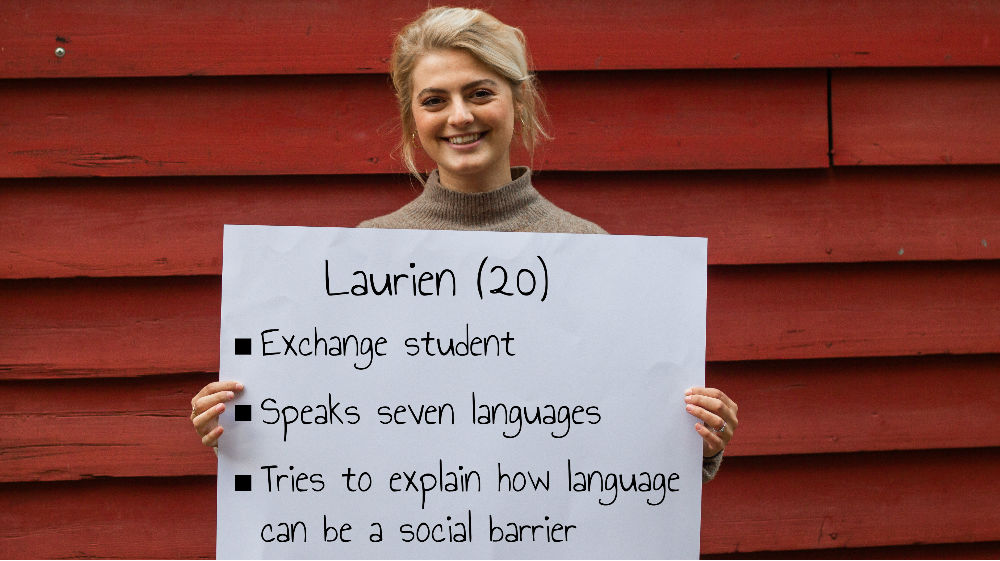Laurien Michiels comes from Belgium, but can speak Swedish.
– Even though I understand some Norwegian, I sometimes find it hard to express myself. There are a lot of expressions and words I don’t know yet, but the hardest part isn’t understanding, it is expressing what I want to say.
The language situation in Norway can also be a challenge.
– Norway has two written languages and a lot of dialects. It’s not like learning one language, but several at the same time, says Laurien, who tries to speak as much Swedish and as little English as possible.
– I really want to learn, but I do experience the language as a barrier sometimes.
Being interesting
As an exchange student understanding some Norwegian, Laurien has gotten a close look on how the cultural references can be challenging.
– For example when we listen to music, everyone knows the song, but I have never heard it before. But you can still enjoy a song without knowing it, so that isn’t a big issue. There are other references to cultural or political things that occur in conversations, that are more problematic. If I don’t know anything about them, it is hard to follow the conversation.
For Laurien, there has been another challenge. When meeting her, you’ll notice that she speaks Swedish, but that she isn’t from Sweden.
– This leads to the fact that I have the same (or similar) conversation over and over again. I understand that everyone is wondering why this girl from Belgium speaks Swedish and six other languages, but I sometimes find it hard to get past that topic in a conversation, she says, and adds that she of course understands why people find this fascinating.
This is probably highly relatable for people who have studied abroad. The fact that you are from another country might be interesting enough to start a conversation, but can also feel like a barrier to really getting to know someone. When you meet someone you don’t know anything about, you have to communicate to get to know them and find them interesting. When the interesting thing appears automatically, you have an easy conversation starter, but you aren’t obliged to follow up.
You can listen to Ordskifte talking with Laurien about language as a social barrier here:
Language as a social barrier
Laurien agrees that trying to connect socially when you don’t speak the same language is a challenge.
– It is challenging, because you have to concentrate on the content of a conversation, and also because you need to process that information to create a response. So it could be defined as input – translation – process – translation – output, and this all in a matter of seconds. It is also challenging on other levels because because you don’t share the same cultural references. So even though you understood something does not always mean you will be able to reply on it because the understanding of the reference is lacking, she says.
In Bergen, most exchange students live in selected areas, like Fantoft or Alrek.
– There is a well known tendency that exchange students (not only in Bergen) stick together with other exchange students. Often even with students who come from the same countries as themselves or speak the same languages as themselves.
Norwegian might be hard to learn, especially if you’re only staying for a semester or two.
– Speaking English will probably take you far. The only problem that occurs is when the exchange students communicate in English which is called ”Erasmus English”. Many universities warn us exchange students of this. Not all exchange students are as proficient in English. This forces them to use simplified incorrect English. People often subconsciously sympathise with each other and will also lower their level of English to make themselves understandable, ultimately leading to a stagnating learning process of the English language.
Hot tip from Laurien
Laurien has a hot tip for her fellow exchange students.
– It is important that we, as exchange students, take responsibility to get in touch with ”the natives”. And how can we do that? I recommend volunteering in a student organisation, a sports club, or even just go out dancing. It is always easier to be social when you’ve been drinking a little. I also recommend following a Norwegian language course.
– And what if this doesn’t work?
– There are many possibilities. I would also recommend checking out ESN buddy, or Tandem Language Learning. There are no garanties that you will get a language buddy, but it won’t hurt to give it a try.


